|
AIDS - short for Acquired Immune Deficiency
Syndrome, a
disease
caused by the HIV virus. The disease apparently jumped from
monkeys
into the human population many decades ago somewhere in Africa, then
spread rapidly around the world in the 1980s. The virus attacks
the
body’s biological defense system, making the infected person extremely
susceptible to other diseases. It is spread through contaminated
body fluids, such as blood or semen.
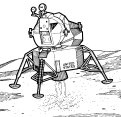 Apollo
11 - the space mission that carried three American astronauts to
the
moon in 1969. Neil Armstrong was the first to step out of the
landing
module and onto lunar soil. As he did, he said, “That’s one small
step for man, one giant leap for mankind.” Apollo
11 - the space mission that carried three American astronauts to
the
moon in 1969. Neil Armstrong was the first to step out of the
landing
module and onto lunar soil. As he did, he said, “That’s one small
step for man, one giant leap for mankind.”
The landing carried out the pledge of President
John F. Kennedy to put a man on the moon by the end of the
decade.
At a time of great turmoil, the event helped pull people together in
celebration
of a great accomplishment. Some 600 million viewers watched the
event
on television worldwide.
baby boom - the jump in birthrates in the years
after
World War
Two. “Baby boomers” are the generation born between 1945 and
about
1960. In this period, more than 65 million children were
born.
They grew up in a generally prosperous period in American life, but
also
experienced as teenagers the uncertainties and conflicts of the 1950s
and
1960s.
Black Power - a term that encompasses a wide range
of
activities in the late 1960s aimed at increasing the power of blacks in
American
life.
Its leaders, including Malcolm X, generally favored more forceful
action
than those of civil rights leaders like Rev. Martin Luther King.
The more extreme leaders, organized in the Black
Panther Party, called for measures like armed resistance to what they
said was widespread police
brutality.
More commonly, the Black Power movement sought goals such as the
development
of black-owned businesses and local control of schools in black
neighborhoods.
Many of the goals of the movement were achieved
as blacks moved into mainstream American life and politics. The
movement
faded in the 1970s as these successes were achieved, and black and
whites
citizens rejected the more radical measures of groups like the Black
Panther
Party.
Brown v. Board of Education - the
Supreme Court
decision in 1954 that declared segregation of public schools
unconstitutional.
The case was brought by the father of a girl in Topeka, Kansas.
The
child had to attend a segregated black school instead of an all white
school
that was much closer to her house. Her case was argued by
Thurgood
Marshall, who later became the first black Supreme Court justice.
The Brown decision overturned the Court’s earlier
ruling in Plessy v. Ferguson (1896), which held that
“separate
but equal” public facilities were constitutional. In later cases
in the years after the Brown decision, the Court extended its
logic
to an almost total ban segregation.
bureaucracy - the offices and people that get the
day-
to-day
work of government done. This part of the government grew rapidly
in the 1960s and 1970s as new laws and programs were created to deal
with
social and environmental problems.
While the bureaucracy is a necessary part of the
government, it is sometimes criticized as a kind of “permanent
government”
that is not as responsive as the elected offices.
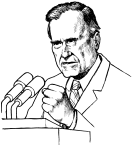 Bush,
George H. W. - the president elected in 1988 who rose to the top
job
after serving as vice-president under Ronald Reagan. He served
one
term. Bush,
George H. W. - the president elected in 1988 who rose to the top
job
after serving as vice-president under Ronald Reagan. He served
one
term.
Bush is best known for his leadership during
Operation
Desert Storm, the military strike to free Kuwait. That small but
oil-rich nation in the Middle East was attacked and occupied by Iraq in
1990. Bush assembled a coalition of 25 nations committed to help
restore freedom. His popularity ratings soared as Iraqi forces
were
quickly pushed out of Kuwait.
The Republican president stumbled on the issue of
taxes and the national debt, however. After a pledge of “no new
taxes,”
he agreed to a compromise with Democrats in Congress to raise some new
taxes to avoid creating even greater federal debts. But his
switch
of position cost him some credibility with voters. A downturn in
the economy also helped bring victory to the Democratic challenger,
Bill
Clinton, in 1992.
 Bush,
George W. - elected president in 2000, he is the son of President
George
H.W. Bush and is a former governor of Texas. Bush,
George W. - elected president in 2000, he is the son of President
George
H.W. Bush and is a former governor of Texas.
The presidential election was so close that the
Supreme Court was called upon to decide how certain ballots cast in
Florida
should be counted.
The threat of terrorism was the first major
challenge
for the new president. His firm but steady reaction to the
attacks
on Sept. 11, 2001 against the World Trade Center and the Pentagon won
him
wide respect. The Bush administration quickly enlisted the
support
of many other nations in a military action in Afghanistan to capture or
destroy groups that had aided the attackers.
At home, President Bush pushed for a reorganization
of various federal offices under a new Department of Homeland
Security.
The nation began planning for the possibility of even larger terrorist
attacks against the U.S. by followers of Osama bin Laden.
The president's decision to send troops to
the Middle East in a showdown with the Iraqi dictator Saddam Hussein,
however,
brought some criticism from those who hoped war could be avoided.
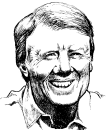 Carter,
Jimmy - the one-time peanut farmer and former Navy officer from
Georgia
who was elected president in 1976. He made human rights and the
nation’s
energy supply key topics of his administration. This Democrat
served
only one term before losing the 1980 election to Republican challenger
Ronald Reagan. Carter,
Jimmy - the one-time peanut farmer and former Navy officer from
Georgia
who was elected president in 1976. He made human rights and the
nation’s
energy supply key topics of his administration. This Democrat
served
only one term before losing the 1980 election to Republican challenger
Ronald Reagan.
Carter and his wife Rosalyn were both from a rural
background and projected a sense of decency and old-time values that
had
a great appeal after the turbulence of the 1960s and early 1970s.
These values led Carter to push for cuts in U.S. aid to Latin American
countries known for abusive actions against their citizens.
Carter
also criticized Russia for its abuse of human rights and imprisonment
of
dissidents.
One of Carter’s greatest achievements came from
his efforts to bring Egyptian and Israeli leaders to Washington for
peace
talks. The negotiations resulted in a historic peace treaty,
called
the Camp David Accords after the presidential vacation spot in Maryland
where the talks were held.
In America, however, Carter was unable to find a
solution to serious economic problems. Inflation of prices was
lowering
the buying power of wages, and high interest rates made it difficult
for
home buyers to afford loans. Business growth stagnated.
Events in the Middle East also hurt Carter’s
presidency.
Militant religious extremists in Iran took more than 50 Americans
hostage
in 1979. Efforts to negotiate their release and an airborne
military
rescue attempt all failed. Televised news scenes of Iranians
shouting
“Death to America” continued month after month as the 1980 presidential
election approached.
Carter lost his reelection bid, but even after
leaving
the White House remained visible in various causes devoted to peace and
justice.
Cesar Chavez - a labor leader who launched a
famous
boycott of
grapes in the 1960s as a way of forcing better treatment of migrant
farm
workers. His work established the United Farm Workers union, and
is a source of great pride for Hispanics nationwide.
Chavez was the son of Mexican American migrant farm
workers, and picked crops himself as a child. He was familiar
with
the difficulties the migrants faced, including low pay, unsanitary
conditions,
and obstacles to education for children. His marches and protests
forced many middle class Americans to think for the first time about
the
people who picked the nation’s food crops. He died in 1993, but
his
work continues through organizations like the United Farm Workers.
civil disobedience - the deliberate breaking of a
law
in order
to draw public attention and debate to a cause or issue. Civil
rights
activists working with Rev. Martin Luther King often used this approach
to challenge segregation. King defended such actions as
justified,
provided that those challenging the law do so “lovingly” and with a
willingness
to accept the penalty.
Critics, however, said that using the tactic tended
to weaken the basic principle that citizens have a duty to obey laws
until
they can be changed through legal processes.
Civil Rights Act of 1964 - a key civil rights law
sought by president
John F. Kennedy, and passed by Congress the year after he was
assassinated.
The law states that all citizens must have equal access to public
facilities
and to private businesses serving the public (restaurants, etc.).
It also prohibits discrimination in the work place based on race, sex,
religion, or national origin.
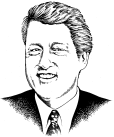 Clinton,
Bill - the Democratic president elected in 1992 who called for a
“redesign”
of government, then became involved in a scandalous affair that nearly
cost him the White House in his second term. Clinton,
Bill - the Democratic president elected in 1992 who called for a
“redesign”
of government, then became involved in a scandalous affair that nearly
cost him the White House in his second term.
Clinton came of age during the 1960s, and was
inspired
by the idealism of that era. He spoke of himself as a “New
Democrat.”
By that, he meant that he embraced the traditional Democratic concern
for
the underprivileged, but was also aware that the government could not
solve
every problem by itself.
The mix was not always easy to maintain. He
joined the call for welfare reform long supported by Republicans, for
example,
but resisted supporting real change until it was nearly forced upon him
by Congress.
Especially controversial was a plan he and his wife,
Hillary, supported to create a national health care system.
Old-line
Democrats had long sought such a system, in which the government would
manage or provide most health care. But many critics pointed to
the
serious problems government run health systems were having in other
countries,
such as England. In the end, the proposal was not supported by
Congress,
and died.
In his second term, news surfaced that the president
had engaged in a relationship with a young woman working at the White
House,
Monica Lewinsky. Clinton denied the allegations, as he had other
claims of a similar nature that had surfaced before. When the
truth
of the charges became clear, Republicans in Congress attempted to
remove
him from office. The attempt failed, but left Clinton’s
credibility
badly shaken.
conservative - political or social views that put
a
great emphasis
on preserving traditional values and social patterns. (Contrast
with
liberal views, which place less emphasis on tradition, and more on the
ability of a society to create for itself new values and social
patterns.)
Conservatives view social patterns such as marriage,
religion, gender roles, etc., as the result of many thousands of years
of human development. These patterns of life represent the
accumulated wisdom of past generations, conservatives say, and should
not
be casually thrown aside.
Conservatives are not opposed to change in society,
as is sometimes said by liberals. But they believe changes should
carefully build upon, rather than simply overthrow, the important
traditions
of society.
For example, conservatives have long argued that
most government welfare programs tend to break up traditional marriage
patterns and create single-parent homes. The end result,
conservatives
say, is a worse form of poverty than existed before.
Conservatives
say welfare policy must favor keeping families together, and require
recipients
to get real jobs as quickly as possible.
Cuban Missile Crisis - a crisis during 1962 that
began
when the
U.S. discovered that the Soviet Union was installing missile launch
equipment
in Cuba. The missiles were capable of carrying atomic weapons,
and
much of the U.S. would be within their range.
President John Kennedy ordered a naval
blockade
of Cuba. He warned that unless the Russian leaders ordered the
removal
of the launch sites, American planes would bomb the sites. The
world
waited nearly a week for the Soviet response, fearing that the
stand-off
might trigger a nuclear war.
Fortunately, the Soviet Union agreed to dismantle
the sites, and Soviet ships carrying weapons to Cuba were ordered to
return
home. But the incident left many people frightened with the
realization
that the danger of atomic war was all too real. Some Americans
began
building basement fallout shelters, and basements in many large public
buildings were equipped with food and water supplies. As nuclear
weapons grew even more powerful, however, many people concluded that
such
measures were futile.
Desert Storm - the 1991 action led by the U.S. to
free
Kuwait
from occupation by Iraq. It is also called the Persian Gulf War.
Iraq, under the leadership of Saddam Hussein, had
been aggressively seeking to expand its power in the Middle East for
many
years. Hussein himself was a dictator who ruled through a
combination
of brutality and assassination. In taking Kuwait, he gambled that
the U.S. would not want to risk a war.
President George Bush, however, reacted swiftly
to the Iraq invasion. He pulled more than two dozen other nations
into the effort to free Kuwait. In January of 1990, air strikes
began
against Iraq, and a month later, a ground assault was launched.
In
a matter of a few days, the Iraqi forces were fleeing Kuwait. As
they left, they set many of the area’s oil wells on fire, creating a
monumental
fire fighting task.
While Kuwait was free, Saddam Hussein remained in
Iraq, and remained a source of trouble in the region.
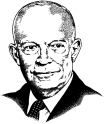 Eisenhower,
Dwight D. - president of the U.S. from 1953 to 1961, a period of
prosperity
in America but also a period marked with the international tensions of
the Cold War. Eisenhower,
Dwight D. - president of the U.S. from 1953 to 1961, a period of
prosperity
in America but also a period marked with the international tensions of
the Cold War.
Eisenhower had risen rapidly as an army officer
during World War Two, and was the commander of Allied forces in Europe
at the time of the D-Day landings and the liberation of France.
He
left active duty after the war, and became the Republican candidate for
president in 1952. His easy-going, friendly and somewhat
conservative
spirit was a good fit for the times, and he easily won reelection in
1956.
Conflicts created by the Cold War took much of his
attention. He helped negotiate peace in the Korean War in 1953,
and
he expanded American alliances with countries in other parts of the
world
to help stop the spread of communism.
At home, a big issue was the Civil Rights movement
that grew after the Supreme Court ruled segregated public schools
illegal
in 1954. When the governor of Arkansas tried to defy the ruling
in
1957, the president sent in federal troops to escort African-American
students
into a previously all-white school in Little Rock.
Eisenhower is often remembered today for his warning
about what he called “the military-industrial complex.” He argued
in a famous speech that the great size of the military and
military-related
corporations posed a possible danger for America’s political
system.
The danger could only be avoided, he said, if citizens made it a point
to be well-informed about issues involving these groups.
entrepreneur - an individual who starts a new
business
enterprise,
especially one involving a new product or service.
Environmental Protection Agency (EPA) - a federal
agency created
in 1970, with wide powers to regulate pesticides, toxic chemicals,
sewage
treatment plants, and other sources of pollution. Concern about
the
environment had been growing rapidly since the publication of Rachel
Carson’s
book, Silent Spring, in 1962. The book warned of the dangers to
the
natural world of many chemicals used in industry and agriculture.
federal debt - the money the country owes as a
result
of shortfalls
or “deficits” in the nation’s budget. When federal taxes do not
raise
enough money to cover the expenses of the federal government in a given
year, there is a deficit. The government borrows money to cover
the
deficit - sales of U.S. Savings Bonds are one method of
borrowing.
Since these shortfalls or deficits have been a regular fact of
government
in recent decades, the borrowed money now adds up to a sizable debt.
The debt, now in the trillions, has grown so large
it is hard to even grasp the amount mentally. Presidential
candidates
always make a big issue of the debt, but once in office, tend to avoid
doing much about it. Paying down the debt quickly would require
either
raising taxes or cutting programs, neither of which is very attractive
to politicians.
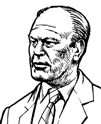 Ford, Gerald - the vice-president who
became president
in 1974
when Richard Nixon resigned over the Watergate scandal. Ford had
a reputation as a solid and respected Republican, and did much to
reassure
the country that the American system of government would survive the
scandal. Ford, Gerald - the vice-president who
became president
in 1974
when Richard Nixon resigned over the Watergate scandal. Ford had
a reputation as a solid and respected Republican, and did much to
reassure
the country that the American system of government would survive the
scandal.
Much controversy surrounded Ford’s decision to issue
a full pardon for the former president, however. He said the
pardon
would allow the country to move ahead, and was not part of any
“deal.”
Still, many critics said the pardon short-circuited the judicial
process.
Ford was re-nominated by the Republicans in the
1976 election, but lost to Democrat Jimmy Carter.
Freedom Riders - whites and blacks who organized
trips
to challenge
segregation in bus terminals in the South in the spring and summer of
1961.
The Freedom Riders would go by bus into an area, and check to see if
the
terminals were illegally divided into separate areas for whites and
blacks.
(A 1950 Supreme Court decision had outlawed segregation in interstate
travel.
The decision, however, was widely ignored in the South.
In Alabama, the Freedom Riders were met by mobs
in some areas, and one bus was firebombed. The federal government
ordered interstate trains, buses, and airports integrated
immediately.
Within a few months, the old signs in waiting rooms, “White,” and
“Colored,”
were gone forever.
Friedan, Betty - a leading feminist writer and
organizer whose
book, The Feminine Mystique,
helped launch the Women’s Liberation
movement
in the 1960s.
Friedan argued that the traditional role of the
stay-at-home mother was oppressive and frustrating for women. She
called on women to reject traditional roles and fight for complete
equality
in the workplace and schools. In 1966 she became one of the
organizers
of the National Organization for Women (NOW).
The decades since have seen a rapid growth in the
number of women with children who also hold jobs outside the
home.
Many more women also pursue higher-level jobs and advanced education.
global economy - a term for the fact that the
economies
of most
of the world’s nations have become increasingly interconnected.
For
example, a computer chip designed in America may be produced in a
Korean
factory for use in a Japanese VCR that is sold in a dozen or more
countries.
The trend has opened many opportunities, but it
also creates some problems. Companies often move factories from
high
labor cost countries like the U.S., and build them instead in Asia or
Mexico.
hippies - young people of the late 1960s and early
1970s who
adopted a “do your own thing” lifestyle that often included wild hair,
brightly colored clothing, communal living arrangements, and drug
use.
The hippies sometimes called themselves “Flower Children,” and
criticized
“straight” society for being too concerned with material success.
(Most hippies themselves, however, were from middle or even upper class
family backgrounds.)
Hippies made a cause of “love” and “peace,” but
had less to say about commitment and responsibility. Many were
deeply
concerned by the gap between American ideals and the realities of
poverty,
discrimination, and war. To some extent, the hippies attempted to
simply create a different social world for themselves based on sharing
and brotherhood. Some, however, seemed more interested in the
hippie
movement’s casual attitude toward sex and drug use.
The movement faded in the mid-1970s, but left an
impact on American ideas and social values that is felt even today.
Intercontinental Ballistic Missile (ICBM) - a
rocket
designed
to carry atomic weapons across the world at high speed. During
the
Cold War, both the U.S. and the Soviet Union created these missiles,
which
were faster and less vulnerable than jet bombers. They are
typically
kept in special underground silos, ready for launch against an enemy's
cities at a moment's notice.
A great fear during the Cold War (and even today)
is that one of these weapons might be accidentally launched, and kill
millions
of people in a nuclear blast.
integration - the deliberate effort to bring
together
blacks
and whites in order to end the pattern of racial segregation.
 Johnson,
Lyndon - the president from 1963 to 1969 who called for a
“War
on Poverty,” but found his political career ruined by his policies in
the
Vietnam War. Johnson,
Lyndon - the president from 1963 to 1969 who called for a
“War
on Poverty,” but found his political career ruined by his policies in
the
Vietnam War.
Johnson, a Texan, was John F. Kennedy’s
vice-president,
and was sworn into office after Kennedy’s assassination in
Dallas.
He continued Kennedy’s push for racial justice, and won support in
Congress
for the Civil Rights Act of 1964.
Johnson won reelection that year, and won approval
of a bold set of social welfare programs under the name “The Great
Society.”
These greatly expanded federal spending for public housing, medical
care
for the poor and elderly, and education for the disadvantaged. He
also pressed for approval of a federal law designed to protect the
voting
rights of blacks.
In Vietnam, Johnson attempted to negotiate peace
terms, but underestimated the determination of the North Vietnamese
communists.
He pressed for a great expansion of American forces in the war, and
began
bombing attacks in an attempt to force a settlement.
As the war grew, however, so did protests by
Americans.
As the 1968 election approached, Johnson announced that he would not
seek
another term. The election was won by a Republican, Richard
Nixon.
 Kennedy,
John F. - the president from 1961 to 1963 who championed the cause
of civil rights and set a goal of landing an American astronaut on the
moon. His years in office are often recalled by his supporters as
a kind of golden era of idealism and change in American life. He
was assassinated in Dallas, Texas, in 1963. Kennedy,
John F. - the president from 1961 to 1963 who championed the cause
of civil rights and set a goal of landing an American astronaut on the
moon. His years in office are often recalled by his supporters as
a kind of golden era of idealism and change in American life. He
was assassinated in Dallas, Texas, in 1963.
Kennedy came from a wealthy Boston family, and
served
terms in both houses of Congress. His race for the presidency is
remembered for a series of televised debates with the Republican
nominee,
Richard Nixon. Kennedy’s youthful look and polished image helped
swing many voters to his Democratic Party ticket. He became the
first
Catholic elected to the White House.
In office, Kennedy’s biggest crisis was dealing
with the Soviet Union’s attempt to place nuclear missiles in
Cuba.
Kennedy ordered a blockade around the island, and Russia agreed to
withdraw
the weapons.
JFK is remembered as the president who launched
the Peace Corps, a program in which American volunteers went overseas
to
help people in underdeveloped areas of the world. Yet he also
expanded
American involvement in the Vietnam War by sending thousands of
advisors
to help the South Vietnamese military.
Kennedy moved cautiously on civil rights at first,
but took steps to fight discrimination in housing. He proposed
the
law that later became the Civil Rights Act of 1964, which generally
prohibited
discrimination in public places.
Kennedy’s death shocked the nation deeply.
An official investigation concluded that the gunman acted alone, but
the
motive remains a mystery.
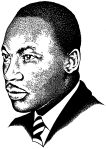 King,
Jr., Rev. Martin Luther - the most famous leader of the civil
rights
movement in the 1950s and 1960s. Rev. King first came to national
attention in the Montgomery, Alabama, bus boycott launched after Rosa
Parks
was arrested in 1955 for violating that city’s segregation laws. King,
Jr., Rev. Martin Luther - the most famous leader of the civil
rights
movement in the 1950s and 1960s. Rev. King first came to national
attention in the Montgomery, Alabama, bus boycott launched after Rosa
Parks
was arrested in 1955 for violating that city’s segregation laws.
King’s influence grew rapidly, in part because of
his dynamic speaking style, and in part because his strategy of
non-violent
protest and civil disobedience drew support from both blacks and many
whites.
Many other whites, however, actively opposed his efforts to bring down
the system of segregation.
King’s arrest in Birmingham, Alabama, in 1963 led
to a historically important document that declared his goals, "Letter
from
Birmingham Jail." That same year, he delivered his famous “I have
a Dream” speech at a massive demonstration by blacks and whites in
Washington,
D.C. The following year, key civil rights legislation was
approved
by Congress, and King was awarded the Nobel Peace Prize in recognition
of his work.
By 1965, King was being partly eclipsed by the more
militant voices of younger black leaders, some of whom rejected his
message
of non-violence. He responded by broadening his reach to include
such issues as the Vietnam War and the problems of the working
poor.
To this end, he traveled to Memphis, Tenn., in 1968 to support a strike
by that city’s garbage collectors. While there, he was killed by
an assassin’s bullet.
His message of hope for racial justice did not die,
however, and his name remains among the most revered of all American
social
reformers.
Korean War - a war that erupted in 1950 when North
Korea, controlled
by a communist government, attacked non-communist South Korea.
The
U.S. came to the aid of South Korea. The war expanded as China
and
the Soviet Union threw their support behind the North Koreans.
The commander of the American troops, General
Douglas
MacArthur, called for the use of atomic bombs against China.
President
Truman, however, rejected that idea, and removed MacArthur from his
position
when he continued pressing for full-scale war against China.
The war ended up as a stalemate. Negotiations
led to a cease-fire in 1951 and a formal agreement to end the fighting
in 1953. The war showed that America would stand behind its
policy
of containment of communism. But it also showed that the policy
could
be very expensive in both lives and money.
Levittown - the most famous of the early 1950s
“mass-produced”
suburban housing developments. It was located on a potato field
on
Long Island, near New York City. The developer, William Levitt,
applied
new building methods to allow quick construction of identical looking
houses
that could be sold at low prices.
This pattern for suburban housing was quickly
followed
throughout the country. The new developments made it possible for
millions of people to own their own homes. But critics said the
new
suburbs were dull and artificial, with little of the diversity and
culture
found in cities or older suburbs.
liberal - political or social views that put a
great
emphasis
on creating new social patterns or values, often with the help of
direct
government action. (Contrast with conservative views, which put
more
emphasis on the importance of traditional values and social patterns.)
Liberals view society as something that can be
easily
reshaped to meet changing conditions. They believe that many
existing
social patterns, including marriage, gender roles, and race relations
are
severely flawed and unfair. Liberals seek to change or eliminate
what they consider flaws in society, often by lobbying for new laws or
regulations to force change “from the top down.”
Favorite causes for liberals include welfare and
other programs to help the disadvantaged. Most also favor
affirmative
action programs for women and minorities in colleges and in the
workplace.
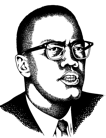 Malcolm X - a leader in the Black Power
movement of the
1960s
who became a symbol of a more militant and separatist side of the civil
rights movement. Born Malcolm Little, he turned away from a past
as a petty criminal to embrace the teachings of the Nation of
Islam.
(He and others in the movement used the X as a replacement for what
they
termed a “slave” name.) Malcolm X - a leader in the Black Power
movement of the
1960s
who became a symbol of a more militant and separatist side of the civil
rights movement. Born Malcolm Little, he turned away from a past
as a petty criminal to embrace the teachings of the Nation of
Islam.
(He and others in the movement used the X as a replacement for what
they
termed a “slave” name.)
As Malcolm X, he developed a following in New York
City’s black neighborhoods for his direct and forceful speeches on
racism
in American life. At the same time, some of the extreme beliefs
of
the movement, including bizarre talk about “white devils,” kept most
whites
uneasy and many frightened.
Following a pilgrimage to the holy city of Mecca
in 1964, Malcolm X broke with the Nation of Islam, adopted more
moderate
views, and spoke of the brotherhood of all races. He was
assassinated
by other members of the Nation of Islam movement in 1965.
March on Washington - the 1963 demonstration that
brought some
200,000 blacks and whites to Washington to press for an end to
discrimination
against blacks.
It is famous as the site where Rev. Martin Luther
King delivered his “I Have a Dream” speech. The speech includes
the
lines, “I have a dream that one day this nation will rise up and live
out
the true meaning of its creed: ‘We hold these truths to be
self-evident,
that all men are created equal.’”
McCarthyism - the making of unproven
political charges,
especially in a “witch-hunt” climate in which an accusation
itself
implies
guilt.
The term was coined by critics of Senator
Joseph McCarthy, who played a prominent role in the “Red scare” of the
late 1940s and 1950s.
In 1950, Sen. McCarthy began claiming communist sympathizers and
supporters held
American government
positions, and began holding hearings to investigate.
Initially there was strong public support for his
efforts. He questioned large numbers of people about their
political past and current views. In a number of cases, people of
questionable loyalty were forced out of government jobs. But his
methods drew increasing criticism, especially his insistence that
witnesses "name names" of others with links to the Communist Party to
prove their own loyalty as Americans.
His support fell further when McCarthy turned his
investigation to examine the U.S. Army. Political leaders
including President Eisenhower decided that his accusations were going
too far. In 1954
the Senate itself voted to reprimand him for improper conduct.
The Red scare faded from the public spotlight, although a lively debate
continues to this day about the truth of McCarthy's
charges, his methods, and his motives.
Monica Lewinsky scandal - a scandal created when
allegations
surfaced in 1998 that President Bill Clinton had a relationship with a
young woman working in the White House as an intern. The incident
also involved false statements to a court by the president in a lawsuit
brought by another woman against Clinton.
When the truth came to light, Republicans in
Congress
attempted to remove him from office for perjury (making false
statements
in court). The effort failed, however, in the Senate trial.
The incident caused wide divisions in public
opinion.
Many condemned Clinton’s behavior as a disgrace, while others shrugged
it off as nobody’s business. In the end, the details were such an
embarrassment that most Americans were glad simply to have the issue
fade
away.
multi-culturalism - a view that America should
embrace
and celebrate
the many different cultures of its immigrants and citizens. This
view contrasts with the “melting pot” view which encourages all ethnic
groups to blend into a common American culture.
 Nixon,
Richard - the Republican president elected in 1968 who pledged to
bring
more “law and order” to America in the turbulent decade of the
1960s.
His presidency ended in 1974, however, when he resigned rather than
face
impeachment in the Watergate scandal. Nixon,
Richard - the Republican president elected in 1968 who pledged to
bring
more “law and order” to America in the turbulent decade of the
1960s.
His presidency ended in 1974, however, when he resigned rather than
face
impeachment in the Watergate scandal.
Nixon had been vice-president in the 1950s under
Dwight D. Eisenhower, and had run unsuccessfully against John F.
Kennedy
in 1960. His political career was revived as the Democratic party
split apart over the Vietnam War in 1968.
Nixon promised to end the war “with peace and
honor,”
a resolution that certainly appealed to most Americans. Once in
office,
however, he found that such an end would not be easily achieved.
As the conflict dragged on, anti-war protests on college campuses grew
more common and violent. Much of the anger of draft-age students
turned to rage against Nixon himself as the president.
Rising crime, especially in cities, was another
challenge of the times. Nixon called for a “war against crime,”
and
said the “first civil right” was the right of citizens to be free of
violence
in their neighborhoods. Crime rates, unfortunately, continued to
rise.
Another crisis in the Nixon years was the Arab Oil
Embargo in 1973. Arab nations in the Middle East stopped
shipments
of crude oil to the U.S. in a blatant attempt to force America to end
its
support of Israel. The U.S. refused to be bullied, and was forced
to deal with shortages of gasoline and higher prices.
A highlight of the Nixon years was his successful
effort to reduce tensions with China and the Soviet Union. Even
his
critics applauded these steps, which greatly reduced the always present
danger of a nuclear war.
Nixon won reelection to a second term in 1972.
But the Watergate scandal (see entry) ended his presidency, and he left
the White House in disgrace. He recovered at least his reputation
for a wide knowledge of international politics, and his advice was
sought
on such matters by later presidents.
 Organization
of Petroleum Exporting Countries (OPEC) - an organization of
nations
that attempts to control the price of oil on world markets through
agreements
to limit production. It is a cartel - the technical term for a
group
formed to gain near-monopoly control of a product and its price. Organization
of Petroleum Exporting Countries (OPEC) - an organization of
nations
that attempts to control the price of oil on world markets through
agreements
to limit production. It is a cartel - the technical term for a
group
formed to gain near-monopoly control of a product and its price.
OPEC is run mainly by Arab countries in the Middle
East. In the 1970s the organization set oil production and sales
limits for its member countries in order to force world oil prices
higher.
The strategy worked, but created sharply higher prices for gasoline,
fuel
oil, and related products in the U.S. The higher prices were a
severe
blow to the nation's economy.
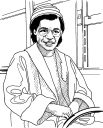 Parks,
Rosa - the African American woman who defied segregation laws in
Alabama
in 1955 by refusing to move to the back of a city bus when a white
passenger
entered. Her action helped launch the modern civil rights
movement,
and led to the organization of a year-long bus boycott by blacks in
Montgomery.
It was in this conflict that Rev. Martin Luther King first came to
national
attention. Parks,
Rosa - the African American woman who defied segregation laws in
Alabama
in 1955 by refusing to move to the back of a city bus when a white
passenger
entered. Her action helped launch the modern civil rights
movement,
and led to the organization of a year-long bus boycott by blacks in
Montgomery.
It was in this conflict that Rev. Martin Luther King first came to
national
attention.
The boycott he led lasted more than a year, and
set a pattern for non-violent but effective challenges to segregation
laws.
The boycott ended in 1956 when the Supreme Court ruled that segregation
in public transportation was unconstitutional.
 post-industrial
society - a society that has moved past the stage of heavy industry
to an economy that is mainly centered on knowledge-based and service
professions.
America today, and many European countries, are post-industrial
societies.
In these countries, factory jobs are falling, but high-tech employment
is growing. The service sector of the economy - which includes
everything
from lawyers to hair cutters - is rising rapidly. post-industrial
society - a society that has moved past the stage of heavy industry
to an economy that is mainly centered on knowledge-based and service
professions.
America today, and many European countries, are post-industrial
societies.
In these countries, factory jobs are falling, but high-tech employment
is growing. The service sector of the economy - which includes
everything
from lawyers to hair cutters - is rising rapidly.
A post-industrial society creates great
opportunities,
but has some disadvantages. Factory jobs that carry high pay for
unskilled labor become scarce. An education beyond high school
becomes
a necessity. People with little education find it very hard to
get
on a career ladder that leads to a middle class income.
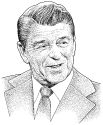 Reagan,
Ronald - the Republican president from 1981 to 1989 who led what is
sometimes called “the conservative revolution” in national politics. Reagan,
Ronald - the Republican president from 1981 to 1989 who led what is
sometimes called “the conservative revolution” in national politics.
Reagan had been a movie actor for much of his early
career before entering politics and winning election as governor of
California
in 1966. In 1980, he ran against Jimmy Carter, and attracted many
voters who felt the Democratic president was indecisive.
Reagan projected a kind of patriotic confidence
in America and its future that had fallen somewhat out of style after
the
Vietnam War and Watergate. He said America needed first of all to
get business growing again, by reducing taxes and excessive government
regulations. These policies were often called “Reaganomics.”
Reagan also called for cuts to many welfare
programs,
claiming that they were not effective, and were even encouraging people
to stay on welfare rolls rather than get jobs. A growing economy
with good jobs, he said, was the best way to help poor people.
Congress approved many of the new proposals.
The country slipped into a recession in 1982, but the next year, a
recovery
was underway. The economy grew steadily throughout the rest of
his
two terms.
Reagan felt the U.S. should stand firm in its
opposition
to communism. Signs were already evident that the standard of
living
in communist nations was falling far behind that in the U.S. and other
free nations. He won from Congress a plan to strengthen the U.S.
military, including money for the so-called “Star Wars Defense” (see
entry).
In 1986, Reagan met with the Russian leader, Mikhail
Gorbachev, to discuss reducing nuclear arms. They also discussed
Gorbachev’s attempts to move Russia to a more open society with free
speech
and other rights. Reagan welcomed the new climate, confident that
the obvious success of America and other democratic nations would
eventually
draw Russia away from its failed system of communism.
Reagan finished his second term in 1989, having
helped his vice-president, George Bush, win the 1988 election.
Reagan
had not radically cut the size of the federal government, as some of
his
supporters had hoped he would do. But he had created an important
shift in political thought and government policy that had long-lasting
effects.
Rodney King case - a legal case in which a black
man
beaten by
police in Los Angeles during an arrest won millions of dollars in an
out-of-court
settlement.
Rodney King was stopped by police in 1991after a
high-speed chase. King attacked the police officers, and was
subdued
only after a fierce struggle. But a videotape made by a bystander
showed that he was struck a number of times after he was finally forced
to the ground.
A deadly riot erupted in Los Angeles after a jury
cleared the police of wrong-doing in the incident. The federal
government
later brought new charges against the police officers for allegedly
violating
King’s civil rights. Some of the new charges were upheld.
The
case was a sign that issues of race and justice were still serious
flash
points in American society.
Roe v. Wade - the Supreme Court case
in 1973 that
legalized abortion
in the U.S. “Roe” was the fictitious name of the woman who
originated
the lawsuit. The court ruled that a woman’s decision to have an
abortion
is protected by the right to privacy implicit in the
Constitution.
The abortion issue continues to be one that generates strong feelings,
with opponents calling it the equivalent of murder. Supporters
continue
to argue that a human fetus is not legally or morally a person, and say
abortion should be an option and a woman’s choice.
Sputnik - the space satellite launched into orbit
by
Russia in
1957. The launch was an embarrassment for the U.S., because
American
rockets were not large or reliable enough in 1957 to put a satellite in
orbit. But the launch led to a “space race” to see which country
would be first to land a man on the moon. The race for space also
had a Cold War angle, because any rocket that could put a satellite in
orbit could also deliver an atomic bomb anywhere on earth.
As a result of Sputnik, American leaders called
for improvements in education, and especially more emphasis on science
and math classes in schools.
Star Wars Defense - the informal name for the
“Strategic Defense
Initiative” proposed by President Ronald Reagan as a defense against
any
missile attack launched against the U.S. The plan called for
creation
of space-based weapons using lasers and other advanced technology to
destroy
enemy missiles shortly after they were launched.
The proposal generated an outcry by critics who
said the proposal would upset the “nuclear balance” with Russia, and
possibly
lead to war. Some said it was technologically impossible.
Others,
however, said it was a good idea, and would prove to Russia that
America
could stay ahead in weapons technology.
Work on the system was abandoned when the Soviet
Union began falling apart in the late 1980s, but there is still
discussion
of the concept as a way of protecting the country from “rogue” nations
that acquire missiles and attempt to threaten the U.S.
Three Mile Island accident - a famous accident at
a
nuclear powered
electricity generating station in Pennsylvania that occurred in
1979.
It resulted in a virtual end to the building of new nuclear power
plants
in the U.S. Three Mile Island is in the Susquehanna River, not
far
from Harrisburg. Nuclear power plants are often located near
rivers
because they need large amounts of water for cooling.
The accident was created by a stuck pressure relief
valve. Instruments in the control room apparently did not give
accurate
information to the operators, and some of the uranium fuel rods
overheated.
As a result, steam and a small quantity of radioactive particles were
released.
The incident created great fears, and a fierce
debate
about how close the reactor had come to what is called a
“melt-down.”
Had such an event occurred, hundreds of square miles would have become
uninhabitable.
Vietnam War - the war launched by Ho Chi Minh in
the
1940s to
force the French, and later, the U.S., out of Vietnam. (Vietnam
had
been controlled by the French for many decades, and the French
completely
dominated the life of the nation.)
The war sharply divided America in the 1960s, and
claimed the lives of more than 50,000 Americans.
The conflict began primarily as a war of national
liberation, a goal that under other circumstances would have certainly
won American support. But Ho Chi Minh also embraced communism in
his fight to liberate the Vietnamese. As a result, the U.S. saw
the
conflict primarily as a dangerous attempt to spread communism. In
the tensions of the Cold War era, America felt compelled to support the
French and non-communist Vietnamese leaders.
Ho Chi Minh’s guerrilla army defeated the French
in 1954, and the nation was temporarily divided into a communist North
and a non-communist South until an election could be arranged to
reunite the country. The election, however, never took place.
American involvement grew in the 1960s, first under
John F. Kennedy, then under Lyndon Johnson. Johnson attempted to
bring peace with promises of financial aid, then stepped up military
action
in hope of forcing the issue. Nothing worked.
A great disadvantage for America was the fact that
the government of South Vietnam was corrupt, and did not have the full
support of the South Vietnamese. For this and other reasons, the
war proved a frustrating experience for U.S. troops, as well as
for
Americans at home. Anti-war protests became a regular feature of
the times.
America began scaling back its support for the South
Vietnamese government in the late 1960s, and pulled out altogether in
1973.
South Vietnam and its capital, Saigon, fell to the communist forces in
1975.
Voting Rights Act of 1965 - an important federal
civil
rights
law that struck down literacy tests and other practices that were
sometimes
used to discourage blacks from voting.
War on Poverty - President Lyndon Johnson’s term
for
his programs
aimed at eliminating poverty in the U.S. These programs included
the Job Corps, which paid school drop-outs to train for jobs in
industry,
and Head Start, an educational program for pre-school children in poor
neighborhoods. Medicaid and Medicare provided better access to
medical
care for the poor and the elderly. Public housing projects and
welfare
programs were expanded. While these efforts helped reduce
poverty,
they did not eliminate it. Some critics argued that the programs
helped create an attitude of dependence on government that led to the
break-up
of families and further cycles of poverty.
Watergate - the nickname given by newspaper
headline
writers
to the scandal that ended the presidency of Richard Nixon. The
name
comes from the large apartment and office complex in Washington that
was
the scene of the crime.
During the election campaign of 1972, a group of
Nixon campaign advisors secretly arranged a break-in at the office of
the
Democratic party in the Watergate building. They planned to look
through the files for any embarrassing information, and wanted to plant
“bugs” on the office telephones.
The burglars were caught, although at first no one
was aware of the political connection. But the facts slowly
emerged
as reporters linked the burglars to the Nixon reelection
campaign.
The president denied having any prior knowledge of the break-in.
But there was evidence that once he became aware of the crime, he tried
to block the investigation.
Hearings held by the U.S. Senate developed even
more embarrassing evidence, including “hush money” paid to the burglars
to plead guilty and keep quiet. It was definitely not the kind of
politics that Americans learned about in high school, and many were
stunned
and angered by the revelations.
In the end, a number of people connected to the
incident went to jail, including two of Nixon’s top aids. Nixon
himself
resigned in 1974 to avoid impeachment. He maintained to the end
that
he did not know about the Watergate break-in in advance, or approve of
any of the crooked dealings exposed by the hearings.
welfare reform - the movement that successfully
sought
during
the 1990s to change welfare laws and place time limits and work
requirements
on welfare recipients.
The push for welfare reform came primarily from
conservatives in the Republican party. They argued that decades
of
expanded welfare programs were creating a permanent welfare class with
little interest in escaping poverty.
The reforms enacted in the mid-1990s allowed states
to set time limits for people receiving welfare, as well as work or job
training requirements. The strong economy of the decade helped
make
the programs more successful than some critics had expected.
Women’s Liberation - the movement launched in the
1960s
to create
a greater equality between women and men. The movement’s leaders,
including Betty Friedan, challenged the traditional idea that women
should
have a special role in the home as wives and mothers. Feminists,
as women in the movement called themselves, sought equal opportunities
in the work place and in schools. They called for equal pay and
promotion
opportunities at work, and sought the expansion of day-care programs in
the work place.
By 1970, women were flooding into careers that had
traditionally been dominated by men. By 1980, women actually
outnumbered
men on college campuses. But many women rejected the views of the
most extreme “women’s libbers,” and argued that feminists were too
eager
to attack men as the source of all problems.
|